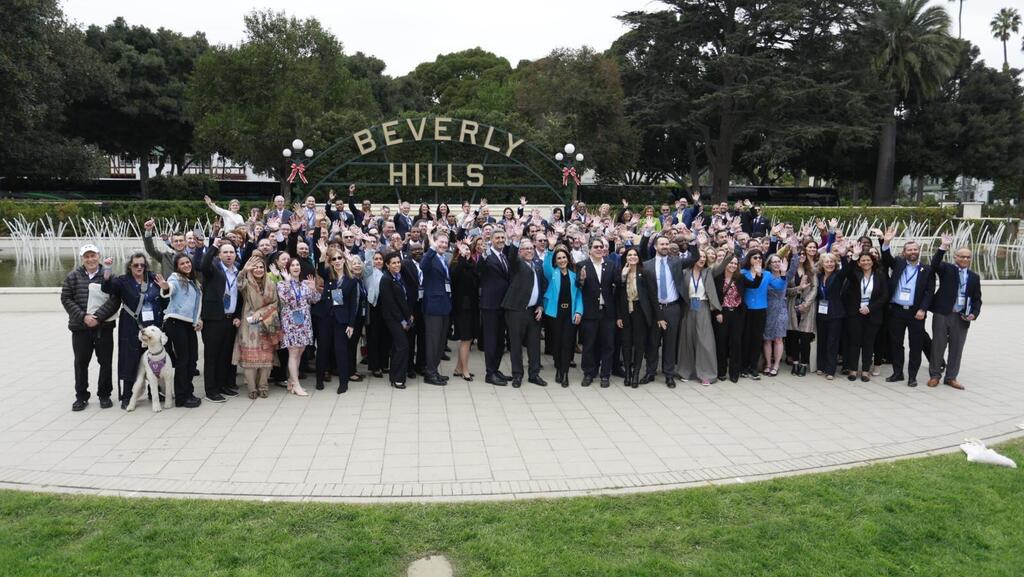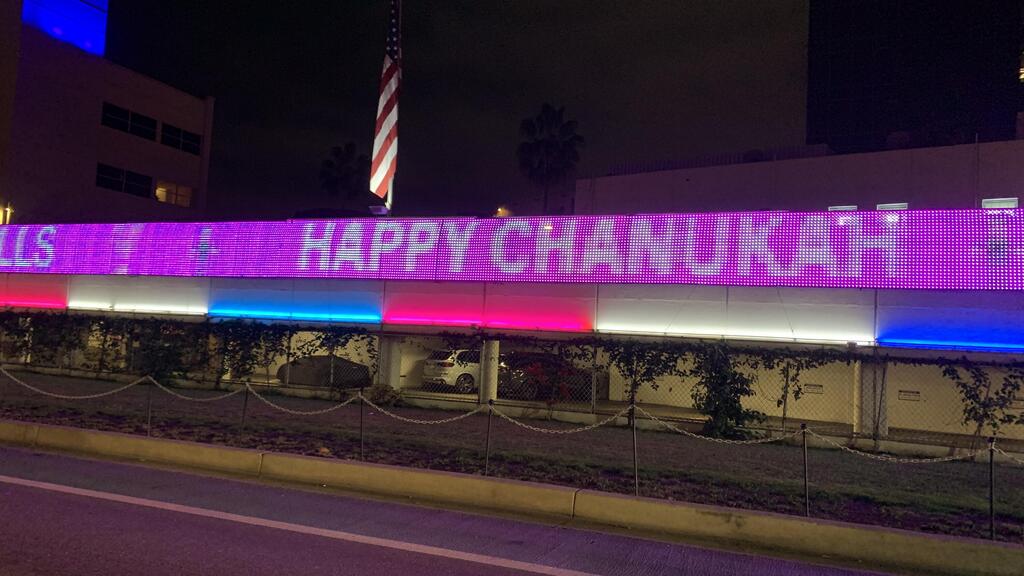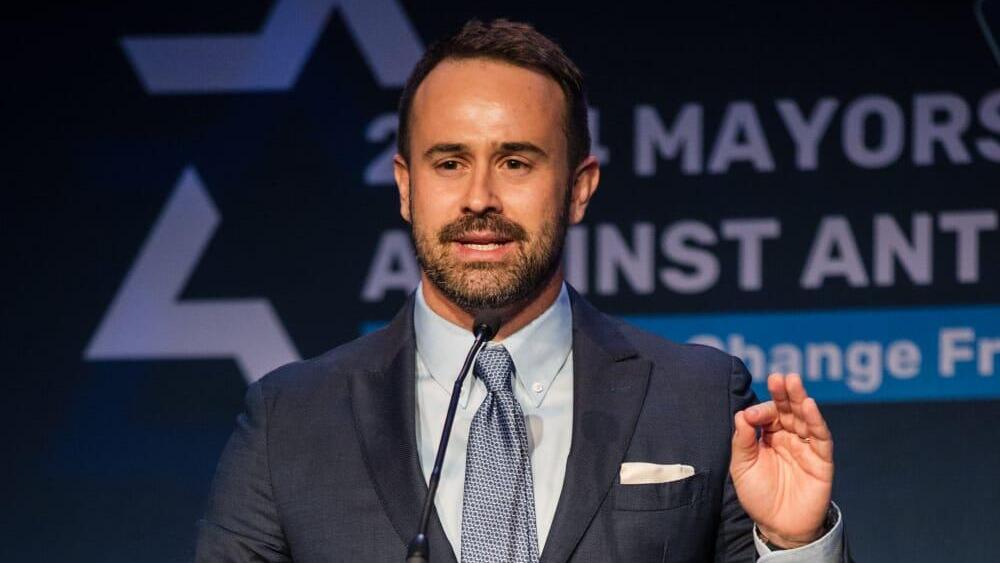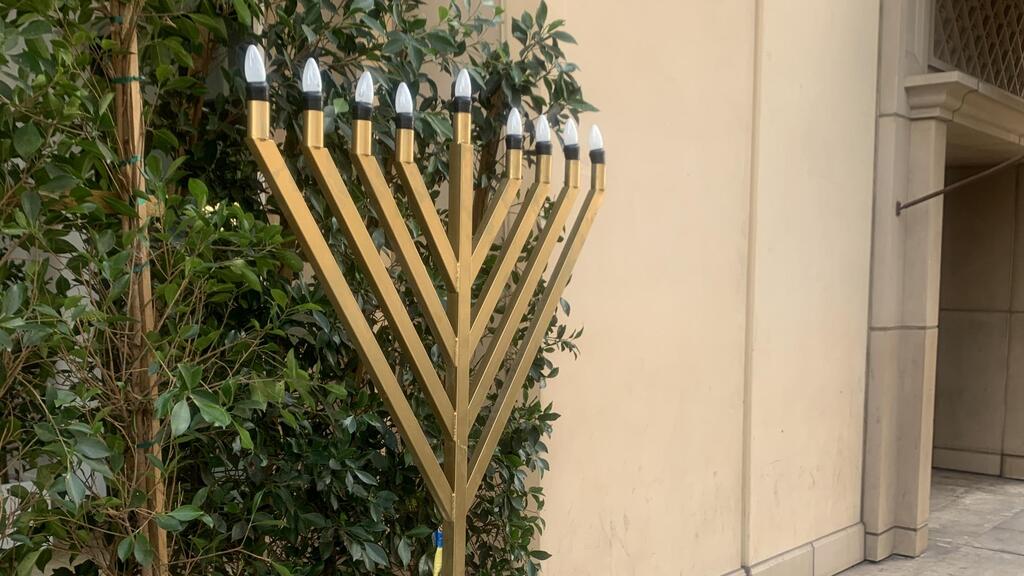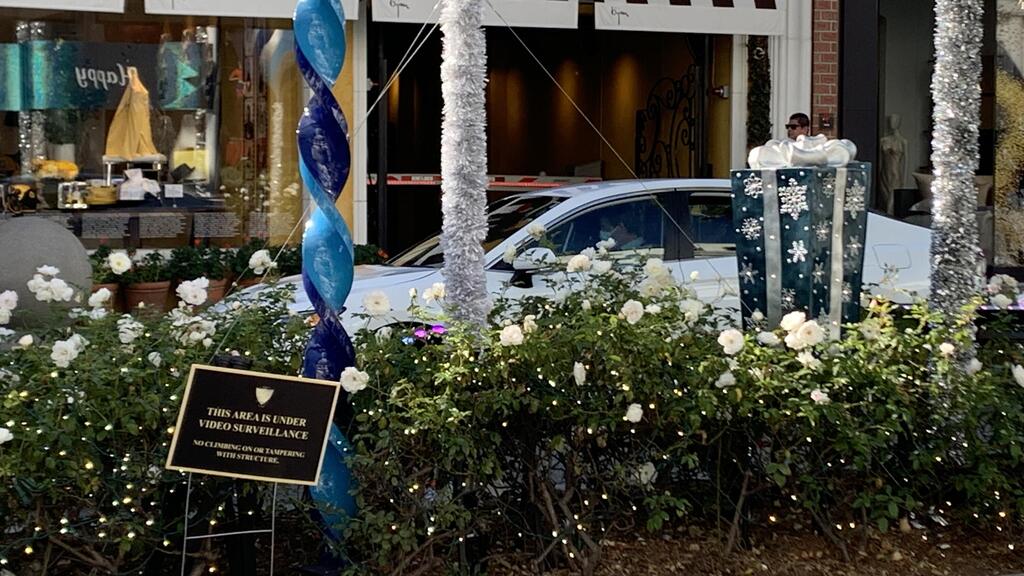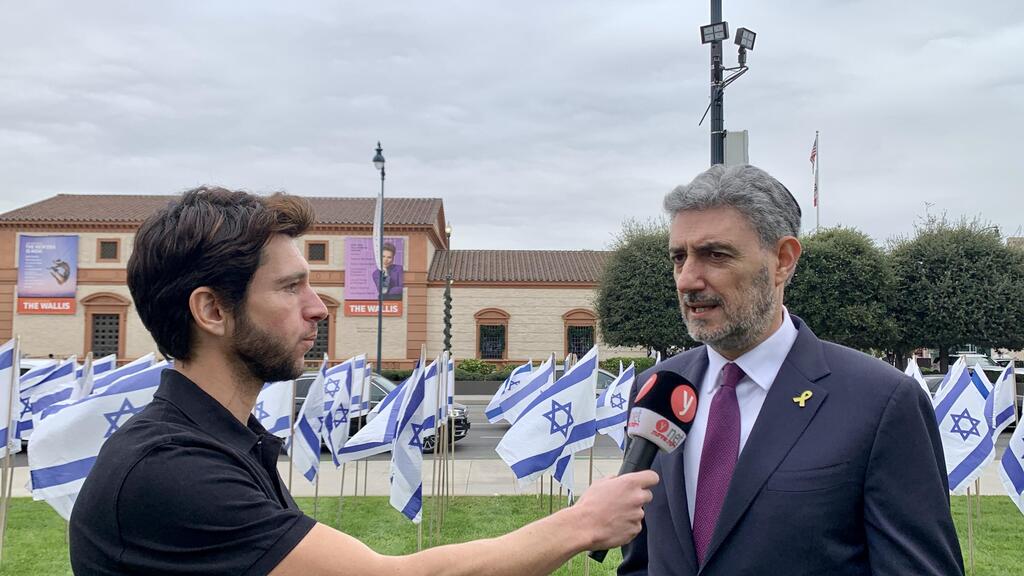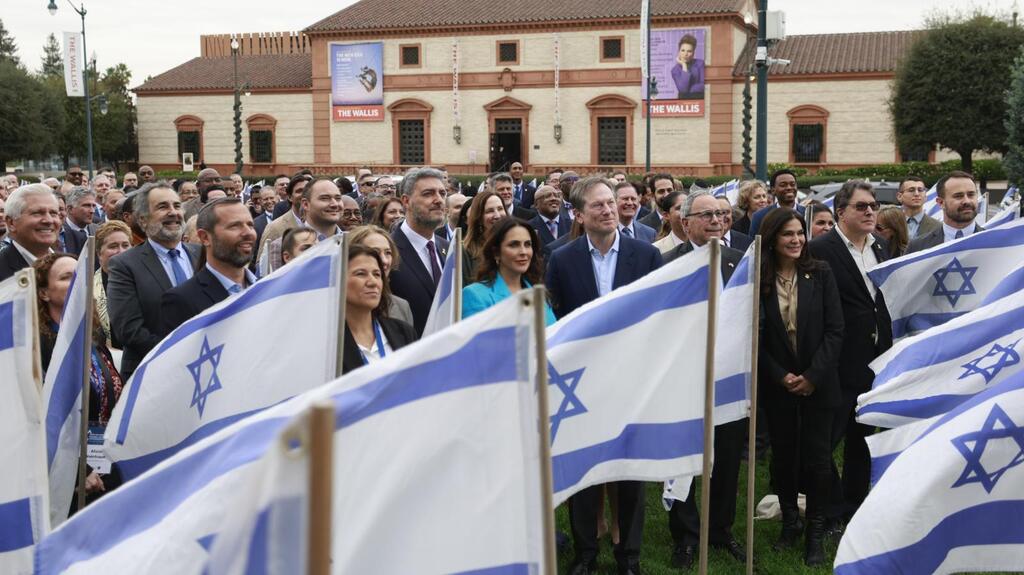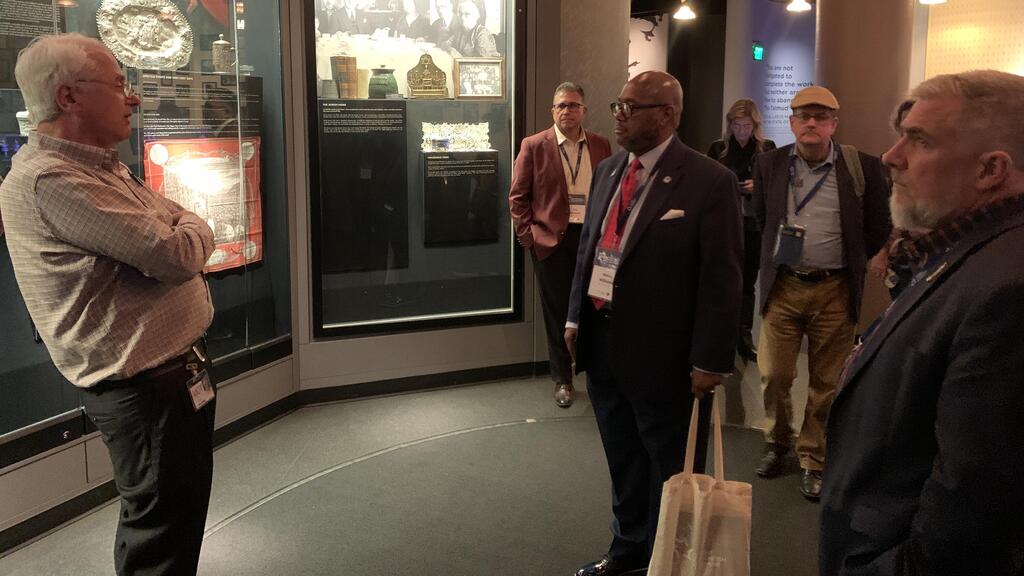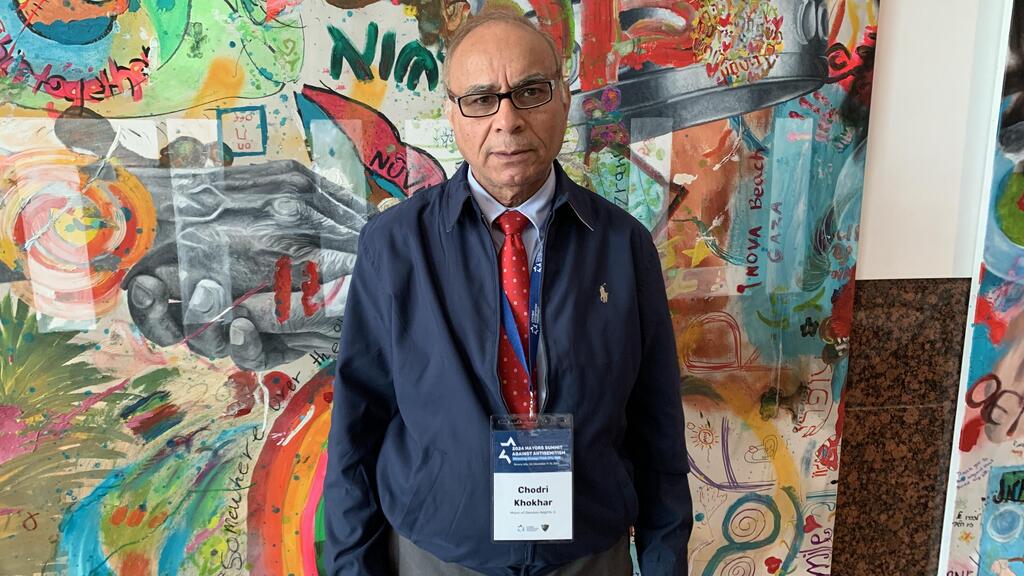Getting your Trinity Audio player ready...
Few conferences measure success by the lack of attendees, but the Mayors Summit Against Antisemitism aspires to a day when it has no purpose. Reality, however, couldn’t seem farther from that goal. Last year, shortly after the October 7 massacre in Israel, the summit hosted by the Combat Antisemitism Movement (CAM) saw around 50 U.S. mayors attend.
This year, a record-breaking 230 city representatives from across North America, including some from Canada, participated, making it the largest mayors' summit against antisemitism ever held.
2024 Mayors Summit Against Antisemitism
(Video: Daniel Edelson)
The urgency to combat the escalating phenomenon in the U.S. is so critical that Beverly Hills — a city with a sizable Jewish population, even boasting a Herzl Way — volunteered to host the summit and help fund its substantial $750,000 cost.
Unlike neighboring Los Angeles, with its sprawling campuses and protests — which opted this year for a prerecorded address from Mayor Karen Bass encouraging participants and emphasizing the importance of their mission — Beverly Hills is fully committed to the cause.
A Jewish city council representative delivered an impassioned speech during the summit's glitzy opening gala, though he seemingly didn't realize the implications of comparing Qatari hotel owners and pro-Palestinian protesters in the city to "gangs" and "thugs," racially charged terms in the U.S. Some attendees left in protest — a reflection of the inevitable tensions when bringing together such a diverse group from across the political spectrum.
Representatives hailed from nearly every state on the continent, from major cities like Miami, San Diego and New Orleans, to small towns like Las Vegas in New Mexico. Disagreements surfaced on many topics, but one issue united everyone: the need to combat antisemitism, even in cities unaffected by it or without Jewish populations.
For some, their first exposure to antisemitic incidents came through virtual reality (VR) stations outside the main hall, which showcased testimonies from the Hamas massacre on October 7, 2023, and the reality following it.
“There are no Jews in my city, but that doesn’t matter because hate is hate,” said Sonja Brown, mayor of Glenn Heights, Texas. “Hate has no color, no religion, but it’s absolutely learned behavior and it’s wrong — whether it’s directed at Black people, Latinos, the LGBTQ+ community or Jews.
“We have hate manifesting in different ways in Glenn Heights that require addressing and honestly, hate in America today is very pervasive. I believe we as mayors can do something about it. If we can uproot hate from the world, it’ll be a much better place.”
Standing beside her during this powerful statement, Kimberly Thomas, mayor of Richmond Heights, Ohio, nodded vigorously: “We’re here to learn as much as we can, to find ways to collaborate and support one another. I came to this summit to stand with my Jewish brothers and sisters because what they’re experiencing is what the African-American community also faces.”
“It’s happening to them; it’s happened to us and it’s not going away. We might have about 2% Jewish residents, but I’m not entirely sure. I plan to conduct thorough research when I return home thanks to this conference,” she added.
At the gala dinner hosted at Paramount Studios, in the heart of a faux New York City street set, Levar Stoney, mayor of Richmond, Virginia, candidly shared about the antisemitic atmosphere he encountered growing up: “I remember someone knocking on our door and I told my family, ‘Hey, a white guy’s at the door.’ My grandma corrected me: ‘Not white, he’s Jewish.’”
“That moment stuck with me — it showed how much we need to fight back. We’ve seen the hate, we’ve grown up with it and there’s still work to do. Tonight, we celebrate our connection, but tomorrow, we get back to work,” he added.
'90% of the attending mayors aren’t Jewish'
According to CAM Director Sacha Roytman Dratwa, the summit's main audience this year is African-American mayors, who "understand that if they don’t confront antisemitism today, it’ll come back to haunt them tomorrow. They too face racism and therefore need the tools, connections and knowledge exchange we’re creating here."
"We’re already seeing results on the ground,” He added. “Just three hours after the summit opened, one mayor called her city hall to request a mapping of all Jewish families to personally check in with them, ask how they're feeling and offer support."
CAM’s Deputy Director Yigal Nisell noted that about 90% of the attending mayors aren’t Jewish. "We have African Americans, Hispanics and mayors from nearly every U.S. state here with a clear stance: supporting the Jewish community and, equally important, supporting Israel.”
“Antisemitism in the U.S. is at its highest level since the Holocaust and it doesn’t matter whether you live in Alaska or New York — you feel it as a mayor and don’t want it to be part of your municipality’s reality. We’re seeing an incredible rise in non-Jewish mayors attending and expressing their support for the Jewish community, which is truly inspiring,” he added.
It’s easy to see why mayors are eager to attend this “all-inclusive” event hosted at the iconic Beverly Wilshire Hotel, famous for its role in “Pretty Woman”, mingling and learning together. But why does a movement to combat antisemitism invest resources in cities with no Jewish populations?
Nisell staunchly defended the choice. “Our goal is, of course, to strengthen the Jewish community’s resilience, but in cities with low Jewish populations, we see higher levels of antisemitism stemming from ignorance and poor education.”
“That’s where we need to focus, and it’s paying off — just like our interventions with universities that have no Jewish students, where we’ve successfully shifted antisemitic discourse,” he explained.
He claimed the approach is already bearing fruit. “There are many organizations fighting antisemitism and we’re not competing with them, but we’ve found a unique niche. Our aim is also to plant seeds we can harvest in the future.”
“Mayors are often at the start of their political careers and may go on to hold significant roles. We’ve already seen a mayor from our summit become a governor and many in the U.S. Congress started as mayors. By the time they reach those positions, our connection with them will already be well-established.”
Entering a new age?
This year, CAM enlisted Lisa Katz to lead the summit. Katz attended last year while serving as mayor of New Castle, New York — a town of about 20,000 residents, including prominent figures like Bill and Hillary Clinton, known for their unwavering support of Israel.
Yet the effects of October 7 were felt even in New Castle. Katz came to last year’s summit seeking practical solutions to address antisemitism in her district, particularly after she decided to fly the Israeli flag at city hall — a move that drew resident complaints and disruptive visits from members of the "Jewish Voice for Peace" anti-Israel movement, who demanded its removal during council meetings.
“Last year’s summit showed me that change is possible and, given my background as a mayor, I feel I can effectively communicate with current mayors to ensure we’re providing them with practical solutions they can implement in their neighborhoods to combat antisemitism daily, right where it happens,” she said.
Dialogue among the mayors themselves is a central feature of the summit, as seen in a panel where leaders of large cities shared advice with those from smaller municipalities on how to counter antisemitism in their areas.
“If I agree to my Jewish residents’ request to display a Hanukkah greeting at city hall, what happens when Satanist groups ask to display their message tomorrow?” one small-town mayor wondered. “I’m obligated to all my residents and this could open a problematic door. What would you do?”
Others face more tangible challenges, like Samuel (Shlomo) Nahmias, 46, the youngest mayor in the history of Lawrence, New York. His town, composed of 80% modern Orthodox Jews, is one of the wealthiest in the state and consequently attracts significant hostile attention — which Nahmias has experienced firsthand.
“Last Rosh Hashanah, on my way back from the synagogue, a man from outside the city approached me and threatened to kill me,” Nahmias recounted. “He said he knew who I was and who my family was and threatened to harm all of us. We called the police, and he was arrested within minutes and sentenced to 60 days in jail.
“But it was an incredibly traumatic experience. Antisemitism comes both from within and from outside and we must eradicate it completely.” Nahmias, who grew up hearing stories from his father, one of David Ben-Gurion's bodyguards, sees himself as continuing the legacy. "The Jewish community needs more security and that's where I come in.”
“My very presence here gives me the chance to listen and see what other city leaders are facing. It's time we show the world that we're united in this fight — not just as Jews, but through cooperation with all communities, whether African-American, Hispanic, Asian or others, to put an end to this hatred. Our ancestors and grandparents endured antisemitism but every nation that tried to eliminate the Jews failed. We won't fade away,” he added.
Nahmias, like many of his colleagues, expresses a sentiment that resonates strongly throughout the conference — the belief that the upcoming year will turn the tide with U.S. President-elect Donald Trump's return to the White House.
"We're entering a new era. This is different leadership and, ultimately, the fight against antisemitism has to come from the top," he said. "[Joe] Biden was a weak leader. His heart was in the right place, but that's not enough when fighting hate. Now everything's about to change."
New index rating action against antisemitism
The primary goal of this year's conference was to develop a practical action plan to combat antisemitism. At its conclusion, an urban action index was launched for the first time, aimed at ranking and evaluating the effectiveness of cities in addressing hate incidents and improving the Jewish community's sense of security.
Based on data collection and city comparisons, the index will rank every North American city by its level of antisemitism and the measures it takes to combat it. The tool will allow cities to assess themselves and learn how to improve.
According to the Combat Antisemitism Movement’s vision, the index won't just be a practical resource for mayors but also for Jews looking for a place to live or even a vacation destination.
Beverly Hills, the first city in the U.S. to dedicate a memorial to the victims of the October 7 massacre, was presented as a model in the fight against antisemitism. The city has made visible efforts to celebrate Jewish culture in public spaces.
During Jewish holidays, anyone strolling through its streets might easily feel like they're wandering through a bourgeois town in central Israel, with lampposts adorned with Hanukkah decorations and blue-and-white menorahs and dreidels proudly displayed everywhere.
Yet, subtle reminders of vulnerability remain — for example, a security sign near an installation on Rodeo Drive, the second most expensive shopping street in the U.S. after New York’s Fifth Avenue, warning that the area is under surveillance. Incidents, it turns out, spare no city, not even the Jewish stronghold of Los Angeles County.
On the first day of the summit, city leaders gathered on the lawn in front of Beverly Hills' iconic sign for a group photo, followed by drone footage of them surrounded by a striking flag display organized by the city in collaboration with the Consulate of Israel in Los Angeles.
The installation featured 1,400 flags, most of them Israeli, each representing a victim of the October 7 attack. Over 30 countries were represented, symbolizing the global scope of the tragedy.
The mayors met with Israel's Consul General in Los Angeles, Israel Bachar, who stressed that, from the state's perspective, they are a more critical strategic asset than senior federal officials. "While they don't directly influence macro policy, they have tremendous impact on residents' daily lives, especially the Jewish community's security.”
“For instance, they can't affect what happens on campuses directly, but they can decide which protests are approved and how the local police handle events. Mayors are the daily frontline in protecting the Jewish community, making our collaboration with them crucial,” he added.
According to Bachar, Israel's advocacy strategy should work "bottom-up" rather than "top-down." "That's what we've learned from the Palestinian approach. They know we're strong in Congress and at higher levels, so they focus their limited political power on trying to infiltrate municipalities," he explained.
"We're here working to block that strategy — to ensure they don't gain a local foothold. This is a critical battle and we're determined to win it."
Israeli Olympic medalist shares encounters with hate
Israeli Olympic medalist Peter Paltchik also attended the conference, urging mayors to use sports to unite and integrate their communities. He shared stories of competitors refusing to face him on the judo mat simply because he's Israeli.
Other Israeli representatives included Danielle Yablonka and Daniel Kopylov. The emotional reaction of a mayor listening to their story at the podium was hard to miss. Kopylov, 21, who was injured in Gaza and lost his leg, and Yablonka, 23, an American-born social media influencer, fell in love while recovering in Israel's Sheba Medical Center. They asked the mayors to use their story as a tool to convey to their communities that antisemitism never stops with the Jews.
The sole Israeli municipal representative at the conference, Israel Ganz, head of the Mateh Binyamin Regional Council and leader of the Yesha Council organization local authorities in West Bank settlements, invited the mayors to visit the West Bank. He was met with promises of widespread visits, including from Democrats.
"Anyone who distinguishes between Israel and the West Bank is anti-Zionist," Ganz claimed. "We've found a group of people here who are rolling up their sleeves and genuinely want to fight antisemitism. If you think the phenomenon stems from hatred of the State of Israel, you're mistaken.”
“The war is much broader and those who pursue the Jewish people do so everywhere. It's simply a pleasure to come here and see loyal friends who want to combat the issue. You're not alone — you've got allies all over the world,” he added.
A Muslim representative
The conference's final day was held at the Simon Wiesenthal Center in the city. After a screening of “The Children of October 7” and a meeting with its creators, Israeli director Assaf Beker and Jewish social media influencer Montana Tucker, the mayors toured the museum.
For Chodri Khokhar, proud of his title as the first Pakistani-American immigrant mayor in the U.S., this was his first visit to a Holocaust memorial museum. "When I signed up for the conference, I was worried people wouldn't like seeing my name on the list," said the mayor of Glendale Heights, a Chicago suburb of over 30,000 residents.
"But I'm not a fanatical Muslim. There are extremists everywhere, and sadly, it's more of a religious issue. We have a large Muslim population and I had a Jewish resident who, after October 7, wanted to leave due to fear,” he said.
“That hurt me deeply. I plan to visit our Muslim centers and talk about how the fight against antisemitism is a fight against hatred." He added he left the conference with a new goal — to establish the town's first interfaith community center for all residents.
This is likely the result the organizers hoped for. "My grandfather passed away this year, knowing that Israel was attacked on all fronts. He survived the Holocaust for these moments," CAM's CEO Roytman Dratwa told the mayors. Nissel added, "One conference like this is a thousand times more effective than sending another pamphlet to city hall. It's worth every penny."
Adam Beren, a Jewish philanthropist from Kansas who founded CAM in 2019 and continues to be its primary funder, agrees. "People always ask me about the situation and compare it to past times. But this isn't the Holocaust. We live in a free country," Beren told the mayors.
Get the Ynetnews app on your smartphone: Google Play: https://bit.ly/4eJ37pE | Apple App Store: https://bit.ly/3ZL7iNv
"What can we do? When things happen to Jews, it's a symbol of the community's overall state. So learn about the Middle East and the more you learn, the more you can act. Now's the time to return to your communities and take action.”
A day after the conference, 230 mayors returned to their cities and towns. Even the Israeli flag display, specially recreated for the event, was dismantled. The lawn in front of Beverly Hills City Hall returned to its usual green visage.





